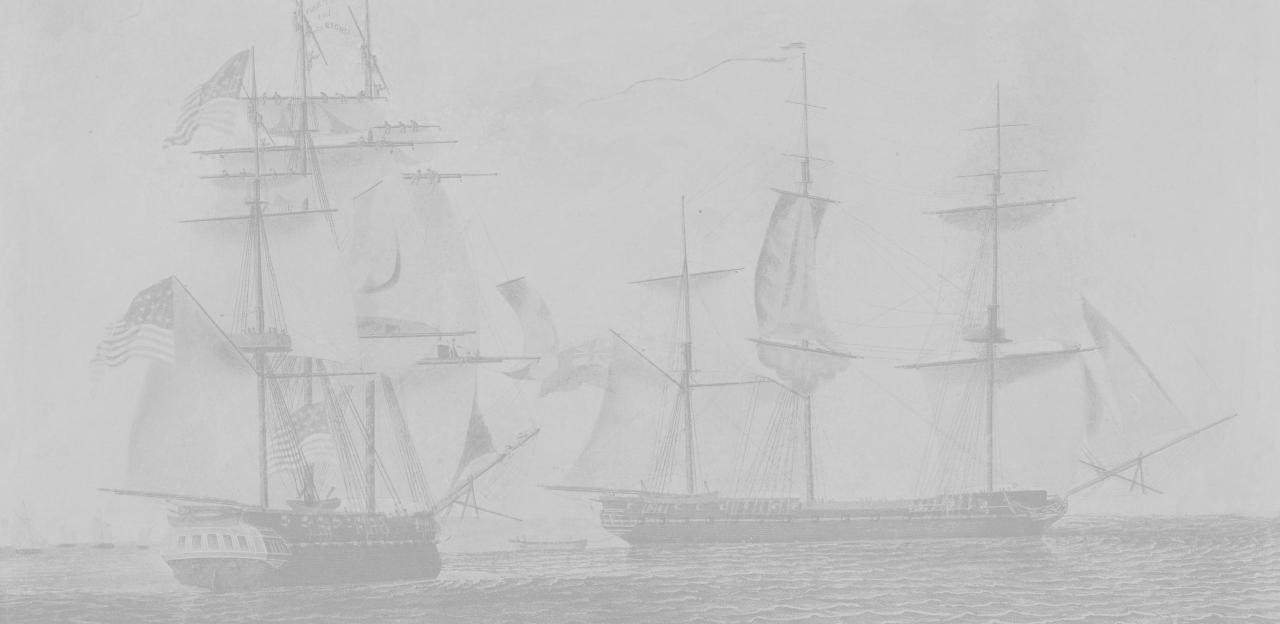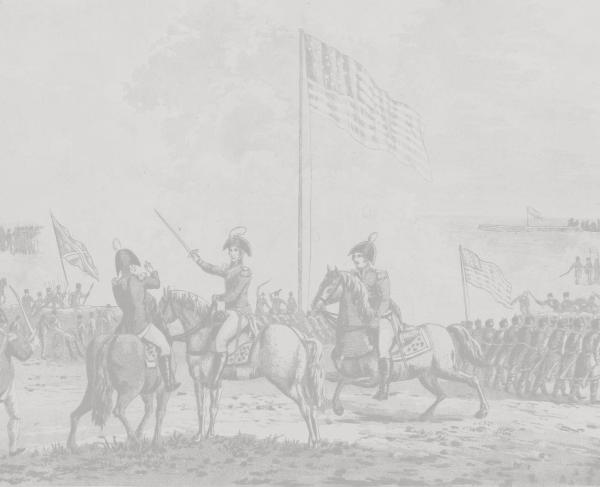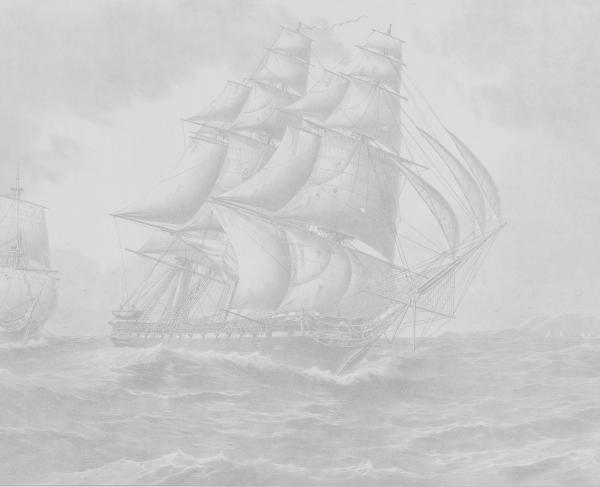1812: "War Against England"

Hezekiah Niles had unsuccessful attempts at printing and publishing until he moved to Baltimore, Maryland, in 1805. There, he edited the daily publication, the Baltimore Evening Post, and politically supported the Democratic-Republican Party. In 1811, Niles starting printing the Weekly Register which also became popular. Through his publications, Niles published regular editorials that were partisan in their opinions, but claimed that he reflected the interests of the American people. He strongly supported the Madison administration and politics during the War of 1812 and consistently aired grievances with Britain, hoping that the conflict would unite the states and political parties in America.
This editorial reflects Niles's strong opinions against Britain and in favor of united fighting to defend American interests in the War of 1812.
“War against England” (Published on June 27, 1812)
Our ancient and inveterate foe, has at length been proclaimed by the constituted authorities of the United States of America. For many years we endured what no independent nation ought to have suffered for a moment, and pursued negotiations like an ignus futuus, becoming more and more involved by insults and injuries; submission to one wrong preparing the war for another. In the valley of humiliation, at the foot of the throne of her ideot monarch, at the threshold of the palaces of the knaves who administer the government in his name, we sought justice and begged for peace: not because we feared war, but from that moderation which distinguishes the people, as well as the government of the United States. While we thus entreated mercy, many thousand seamen, our brethren, neighbors and friends, were groaning out a weary life on board the vessels of her navy: whipped, spurned and kicked by every creature that pleased to abuse them, and some were murdered, basely and deliberately murdered, for nobly attempting to regain that “freedom which is their birth-right,” for gallantly designing to seek their liberty through blood and slaughter. The indignity, abuse and destruction of our seamen, and through them, the violent assault on the sovereignty of the country itself, has long cried for revenge, as preventive of the practice in future: for rather than admit the principle for one solitary hour, or in a single instance, that an American seaman, or a seaman sailing under the American flag, may be kidnapped by these Algerines, there is not a true man among us that would not exclaim – “war- a war of extermination against them.” Great Britain herself would nobly sink into absolute ruin before she would suffer her vessels to be so searched or her seamen so carried away. How monstrous then is it for her to practise towards the United States what should would indignantly refuse to permit another to do to her people! It is traitorous, and shews a mean and pitiful spirit, to palliate or in any manner excuse, or justify, the impressment of our seamen by the British. It springs from a heart so base and sordid, that he who is guilty of it may well be suspected of a disposition to sell his father, mother, wife and children to the Turks for a handful of sequins; to till the soil, or gratify the lust of a master, as slaves. It is an idea that the British, as a nation, would spum at, with the mind of one man; through some shop keepers might wish it tolerated, provided they made a few pence by the compromise between the sovereignty of their country, and, indeed, the freedom of their own persons, and the pitiful profits of trade.
On the various points now at deadly issue between our country and this foreign nation, after the able and masterly manner in which they have been pourtrayed in the message of the president, and in the report of the committee of foreign relations, it becomes us to be silent; simply recommending a frequent perusal of these papers to all who doubt the justice of the stand we have taken. All the world has witnessed our forbearance – our desire of peace has been attributed, even in our own country, to fear. Let the world behold with how great force and power the slumbering Eagle will redress her wrongs when around from the nest where she nourished her young, harmless and unoffending. Let her breast plate be Union.
It us the law of the land that we defend ourselves from British aggressions: it is the legal authority of the country that we shall retaliate our wrongs as the only means to end them. For six years we have contemplated the necessity of this resort, the idea has become familiar, and war has lost half its horrors from being in perspective so long. Our means to carry it on are simple: we are young and vigorous, in all the freshness of youth as to national resources. They require only to be called into action; and we should contemn and despise the creature that underrates them.
The whole population of G. Britain is 12,562,144 souls. The while population of the United States is about half as many. In Great Britain, at least three fifths of the laboring classes are paupers; in the United States there are non-such by the halt, the lame, the blind and the infirm and insane. On this population, so miserably oppressed and worn out Great Britain levies war taxes to the amount of 70 million of pounds sterling, or about $25 per annum for every man, woman and child on the island. Is any man prepared to say that we, a nation of freemen, with full bellies and fertile land, could not pay as much were it necessary? Is the slave more profitable than the free laborer? Compare Ohio with some of the other states and answer the question. Will the man who sees before him no other prospect than monotonous labor and poverty, work as cheerfully and do as much, as he who beholds, in his industry, the ease of old age, with independence from his children?
A one hundredth part of the people of Great Britain cannot point to a spot, and say, - that is mine, or it belongs to my father, or uncle, or cousin. - But a majority in these states can proudly place their foot on the soil and exclaim, - this is mine, or it belongs to my father. The road to competency is free to all, and the same perseverance, frugality and industry that a poor Englishman exercises merely to exist at home, would make a man rich in the United States, in a few years. Whence comes this horrible clamor about “taxes and loans and the like,” but of anti American principles? In time of peaces, every soul in England, on the average, pays a tax of 14 dollars per annum, to the government. The United States, in time of war, require their people to exert themselves, and pay two dollars each to fight their own battles, or less than one twelfth part of what Englishmen pay to support their oppressors. God forbid that the time shall ever arrive when this people may be taxed like the people of England; but how contemptible it is, to be alarmed at the payment of so pitiful a sum from the full coffers of the nation at large, accumulated by many years of unparalleled ease and prosperity! As to the loans, there is a fund that will pay them a thousand times over. We have 650 millions of acres of land to dispose of, which, in due time, will bring us two dollars an acre. But independent of this, it is ascertained that the usual revenues, in time of peace, are sufficient to defray all the expenses of government, and reduce the loans, expected to be made, as fast as desirable.
It is the law of the land that we fight England – it is also the will of the people, goaded by insults and injuries. Hitherto we have been divided into two great political sections, but professed a common object of preserving our glorious constitution pure and inviolate, and of giving perpetuity to the present system of things. An honest difference of opinion existed as to the best means of accomplishing these matters, though some perhaps may have had sinister views. At a time like the present, every honest diversity of sentiment will be sacrificed, or, at least, suffered to rest in peace for a season, on the ALTAR OF UNION. All men admit (or at least every man but a knave or a fool, must admit) there is just cause for war against England, if war can be just, as quakers and some others deny. The injuries received from France do not lesson the enormity of those heaped upon us by England; nor can the crimes of one nation palliate the offences of the other. In this “straight betwixt two” we had an unquestionable right to select our enemy. We have give the preference to Great Britain, not only for our supposed capability to coerce justice from her, but also on account of her more flagrant wrongs. For, putting her on a par with France as to her violations of our commercial rights, what shall we say of impressment, of the murders by the Indians, of the mission of Henry? Besides, France is invulnerable to us; we might as well declare war against the people of the moon as against her; but Great Britain is tangible in her tenderest points. It is contended by some that if one of these powers does us justice, the other will follow the lead. Though we do not subscribe to this doctrine in its fullest extent, we cannot suffer from making an experiment of that which it was impossible to avoid – for war was inevitable, save by the interference of Him who moulds the hearts and dispositions of man.
It is not to be supposed that every man will approve a general measure; but the minority must submit to the majority. It is the first principle of our solemn compact with each other – it is the life of the republic; and of those even who disapprove of a law, the majority will support it while it has authority, though they may exert themselves to repeal it. Unfortunately, and to the lasting disgrace of those who are guilty of it, many endeavors are making to raise up and opposition having for its object the defeat of their own government and the triumph of a foreign enemy. It will not amount to much – the good sense of the people will prevail, as it did in 1776. at that time about one third of the inhabitants of these states were openly or covertly opposed to independence: many through prejudice, some through fear, and a great many from bribery, corruption and interest. The same causes may prevail to a certain extent at this day; and it is to be expected that all that were tories in heart, or in deed, in the war for establishing independence, will also be opposed to the war for preserving it. But the number of such is contemptible. We can watch them better than our fathers were able to do. In 1776, the vessel of state was launched into an unknown sea, to contend with a nation whose power it had been our pride to extol; with whom, and for whom, we had fought, bled and conquered; and we were as children, devoid of arms and the munitions of war, and destitute of every thing but patience and courage. In 1812, we have a stable and solid government, operating upon known and accepting principles to the remotest corners of our territory; we are abundantly supplied with weapons of defence; we are in a state of comparative manhood, and will meet the enemy with confidence over whom we triumphed in infancy.
Let every man, solemnly, in his “closet” put this question to himself: - “Would I send another ambassador to England to crawl on his hand and knees and bed, that my countrymen may not be stolen like African negroes, by the accursed traders in human flesh?”
The spirit of the people is up – the proposition must come from the other side of the water. We have retreated to the edge of the precipice – we have used every argument and exerted every means, to repel the adversary, without striking a blow. We can retire no further. We must strike or perish. The United States were compelled to “unbury the tomahawk,” or become colonies. We have solemnly determined on the former, and may God speed the cause.
WAR IS DECLARED – GREAT BRITAIN IS THE ENEMY. - What American will excite divisions amoung the people, and give aid and comfort to the jealous and unprincipled foe? Who will admit an intruder? - I once saw a man and his wife contending for the breeches – a person interfered with a view to injure the man. The pair left their private quarrel to repel the general grievance – they mauled the foreigner, and then resumed the “management of their own affairs in their own way.” So let it be with US.
To both parties (if two parties will exist) we humbly recommend forbearance and temper. It is not possible for any rational man to believe that the majority of one is under French influence, or of the other under British influence. There must be, and is, bad men in both sides – but nine tenths of either have a common object in repulsing the enemy. A little time and patience with prudence, will bring about a perfect union, when the war really begins. The exertion of all are wanting that its duration may be short; let us not fret each other by general censures which no gentleman would particularly apply to his neighbor who happens to differ in sentiment on some minor points. By such means, in the course of a few months, our jarring opinions will settle down in peace, and every man be prepared to say, Long live America, the asylum of freedom – sovereignty, independent and happy.
Published in The War of 1812: Writings from America's Second War of Independence (New York: Library of America, 2013), Pages 38-43.

